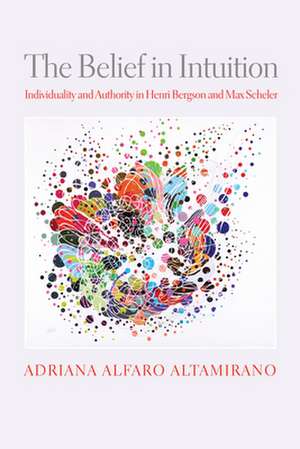The Belief in Intuition – Individuality and Authority in Henri Bergson and Max Scheler: Intellectual History of the Modern Age
Autor Adriana Alfaro Altamiranoen Limba Engleză Hardback – 22 apr 2021
The Belief in Intuition shows that intuition (as Bergson and Scheler understood it) leads, first and foremost, to a conception of freedom that is especially suited for dealing with hierarchy, uncertainty, and alterity. Such a conception of freedom is grounded in a sense of individuality that remains true to its inner multiplicity, thus providing a distinct contrast to and critique of the liberal notion of the self.
Focusing on the complex inner lives that drive human action, as Bergson and Scheler did, leads us to appreciate the moral and empirical limits of liberal devices that mean to regulate our actions from the outside. Such devices, like the law, may not only carry pernicious effects for freedom but, more troublingly, oftentimes erase their traces, concealing the very ways in which they are detrimental to a richer experience of subjectivity.
According to Alfaro Altamirano, Bergson's and Scheler's conception of intuition and personal authority puts contemporary discussions about populism in a different light: It shows that liberalism would only at its own peril deny the anthropological, moral, and political importance of the bearers of charismatic authority. Personal authority thus understood relies on a dense, but elusive, notion of personality, for which personal authority is not only consistent with freedom, but even contributes to it in decisive ways.
Din seria Intellectual History of the Modern Age
-
 Preț: 185.35 lei
Preț: 185.35 lei -
 Preț: 243.50 lei
Preț: 243.50 lei -
 Preț: 330.24 lei
Preț: 330.24 lei - 11%
 Preț: 443.05 lei
Preț: 443.05 lei -
 Preț: 198.00 lei
Preț: 198.00 lei -
 Preț: 203.04 lei
Preț: 203.04 lei - 11%
 Preț: 474.94 lei
Preț: 474.94 lei - 11%
 Preț: 502.86 lei
Preț: 502.86 lei -
 Preț: 466.13 lei
Preț: 466.13 lei - 11%
 Preț: 441.89 lei
Preț: 441.89 lei - 11%
 Preț: 562.11 lei
Preț: 562.11 lei - 11%
 Preț: 624.77 lei
Preț: 624.77 lei -
 Preț: 464.00 lei
Preț: 464.00 lei -
 Preț: 313.45 lei
Preț: 313.45 lei - 23%
 Preț: 427.99 lei
Preț: 427.99 lei - 5%
 Preț: 426.73 lei
Preț: 426.73 lei - 9%
 Preț: 683.85 lei
Preț: 683.85 lei - 23%
 Preț: 526.63 lei
Preț: 526.63 lei - 23%
 Preț: 527.93 lei
Preț: 527.93 lei - 23%
 Preț: 524.72 lei
Preț: 524.72 lei - 23%
 Preț: 427.99 lei
Preț: 427.99 lei - 23%
 Preț: 464.27 lei
Preț: 464.27 lei
Preț: 489.49 lei
Preț vechi: 635.70 lei
-23% Nou
Puncte Express: 734
Preț estimativ în valută:
93.68€ • 97.44$ • 77.33£
93.68€ • 97.44$ • 77.33£
Carte indisponibilă temporar
Doresc să fiu notificat când acest titlu va fi disponibil:
Se trimite...
Preluare comenzi: 021 569.72.76
Specificații
ISBN-13: 9780812252934
ISBN-10: 0812252934
Pagini: 264
Ilustrații: 2 bw halftones, 1 table
Dimensiuni: 158 x 235 x 21 mm
Greutate: 0.48 kg
Editura: MT – University of Pennsylvania Press
Seria Intellectual History of the Modern Age
ISBN-10: 0812252934
Pagini: 264
Ilustrații: 2 bw halftones, 1 table
Dimensiuni: 158 x 235 x 21 mm
Greutate: 0.48 kg
Editura: MT – University of Pennsylvania Press
Seria Intellectual History of the Modern Age
Cuprins
Introduction
Chapter 1. Individuality and Diversity in Bergson and Scheler
Chapter 2. Attempts at Free Choice: Bergson and Scheler on Agency and Freedom
Chapter 3. Bergson and the Morality of Uncertainty
Chapter 4. Varieties of Sympathy: Max Scheler's Critique of Sentimentalism
Chapter 5. Personal Authority and Political Theology in Bergson and Scheler
Conclusion
Notes
Index
Acknowledgments
Notă biografică
Descriere
The Belief in Intuition shows that intuition, as Henri Bergson and Max Scheler understood it, leads to a conception of freedom grounded in a sense of individuality that remains true to its "inner multiplicity," thus providing a distinct contrast to and critique of the liberal notion of the self.
